Guinea-BissauΓουινέα-Μπισάου
After having recovered from malaria, we were ready to enter Guinea-Bissau, a country most people don’t even know it exists! This was the main reason we decided to make a detour to visit it. It is always a pleasure to interact with people who are not accustomed of seeing Westerners and are intact by tourism.
In Africa there are three countries using the word “Guinea” in their name: Guinea (former French Guinea); Guinea-Bissau (former Portuguese Guinea); and Equatorial Guinea (former Spanish Guinea). New Guinea, which is more well-known, is an island in the Pacific Ocean, north of Australia.
Guinea-Bissau was the last country of West Africa that gained independence from colonization, just in 1974. The last Europeans that ruled this small country were not the French, but the Portuguese. Unfortunately, these proved to be the cruelest colonials of all, so independence was earned after a lot of blood had been spilled.
We soon arrived in the capital, Bissau, which looks more like a small, provincial town rather than the capital of a country. We were hosted there by Paulo, an English teacher working for a public school. His house was in the suburbs of the town, in a neighborhood squeezed inside a labyrinth of dirt roads. It consists of a single small room which he struggled to furnish with a bed, a couch and two armchairs. It was a large ground floor building divided in such small rooms with walls not reaching the roof. So, it was like sharing the same space with our neighbors. You could hear everything, especially the man next door beating his wife, the woman crying, screaming and swearing, the children yelling and crying too… Paulo went out to see if there was something he could do but, as he told us later, in these countries they are used to such fights.
Bissau was the first town we stayed where most of the houses don’t have electricity. Of course, almost everybody has a cell phone so, in order to charge it, there are specific stores for these purpose where you pay a small fee for charging! There is also no running water but every neighbourhood has its own well. These are the everyday living conditions not only in Guinea-Bissau but also in many of the countries we will be visiting.
Paulo is a Protestant Christian, so we went to attend the service with him. In a plain building without hagiographies, icons and luxury men, women and children started to gather until there was not a single empty sit left. The service began with religious songs. There was somebody playing electric guitar, another one playing harmonium, while eight young boys and girls were accompanying the main singer. The believers were clapping their hands and were moving their body to the rhythm. If we weren’t aware of being in a temple, we would probably think this was a concert! In the end the pastors of the church preached the word of God. At some point Paulo told us that the pastor asked us to stand up, so that everybody could see us! We were the only white people in the temple and they wanted to welcome us!
Moving east, we visited the scenic old town of Bafatá, with buildings and cobbled streets left behind by the Portuguese. Nowadays they are totally neglected and the town seems more like a ghost town, however bearing still testimony of its glory.

Over the deepest rivers there were small wooden bridges. While passing through the rest, we were soaked wet for good…
We went all the way until Gabú but decided not to enter Guinea straight ahead. We preferred to ride an amazing off-road route through the savannah. We were passing through small settlements of round huts made of mud with roof of straws. Smiling peasants were greeting us all the time! In some parts there was only a small path to ride on. Many times we would find ourselves in front of streams or puddles. Crossing them made us soaked wet, as in some parts the water was more than one meter (3 ft) deep. Where the water was even deeper there were small wooden bridges which we had to cross very carefully. In some village a police officer stamped our passports and through tracks we crossed the border and before knowing it, we entered Guinea.
Here you can watch the video about our adventures in Guinea-Bissau (with English subtitles):
Soundtracks (music of Guinea-Bissau):
Super Mama Djombo – Dissan Na M’bera
Super Mama Djombo – Assalariado
Super Mama Djombo – Indicativo
Manecas Costa – Ermons Di Terra
Αφού αναρρώσαμε από την ελονοσία, ήμασταν έτοιμοι να μπούμε στη Γουινέα-Μπισάου, μια χώρα που οι περισσότεροι δε γνωρίζουν πως είναι χώρα! Αυτός ήταν ένας βασικός λόγος για τον οποίο αποφασίσαμε να κάνουμε μια παράκαμψη και να την επισκεφτούμε. Είναι, άλλωστε, χαρά μας να συναναστρεφόμαστε με ανθρώπους που δεν έχουν ξαναδεί λευκό κι είναι ανεπηρέαστοι από τον τουρισμό.
Στην Αφρική υπάρχουν τρεις χώρες που χρησιμοποιούν τη λέξη “Γουινέα” στ’ όνομά τους. Είναι η Γουινέα (πρώην Γαλλική Γουινέα), η Γουινέα-Μπισάου (πρώην Πορτογαλική Γουινέα) κι η Ισημερινή Γουινέα (πρώην Ισπανική Γουινέα). Η Νέα Γουινέα, που είναι κι η πιο γνωστή, είναι νησί του Ειρηνικού στα βόρεια της Αυστραλίας.
Η Γουινέα-Μπισάου ήταν η τελευταία χώρα της Δυτικής Αφρικής που ανεξαρτητοποιήθηκε από τους αποικιοκράτες, μόλις το 1974. Οι τελευταίοι Ευρωπαίοι που είχαν στα χέρια τους αυτήν τη μικρή χώρα δεν ήταν οι Γάλλοι, αλλά οι Πορτογάλοι. Δυστυχώς, αυτοί αποδείχτηκαν οι πιο σκληροί αποικιοκράτες κι έτσι η ανεξαρτησία κερδήθηκε αφού πρώτα χύθηκε πολύ αίμα.
Φτάσαμε γρήγορα στην πρωτεύουσα, τη Bissau, η οποία έμοιαζε περισσότερο με μια μικρή, επαρχιακή πόλη, παρά με πρωτεύουσα κράτους. Εκεί μας φιλοξένησε ο Paulo, ένας δάσκαλος αγγλικών σε δημόσιο σχολείο. Το σπίτι του βρίσκεται έξω από την πόλη, σε μια γειτονιά χωμένη στο λαβύρινθο των χωματόδρομων. Είναι ένα μικρό δωμάτιο, το οποίο μετά από πολύ κόπο εξόπλισε μ’ ένα κρεβάτι, έναν καναπέ και δυο πολυθρόνες. Ένα μεγάλο, ισόγειο κτήριο ήταν χωρισμένο σε πολλά τέτοια δωματιάκια, που ορίζονταν από τοίχους, οι οποίοι δεν έφταναν μέχρι επάνω. Έτσι ήταν σα να μένουμε στο ίδιο σπίτι με τους γείτονές μας. Ακούγονταν τα πάντα κι ειδικά ο άντρας του διπλανού δωματίου που έδερνε τη γυναίκα του, αυτή τον έβριζε, φώναζε, έκλαιγε, φώναζαν και τα παιδιά τους, έκλαιγαν κι αυτά… Ο Paulo βγήκε έξω για να κάνει κάτι, αλλά όπως μας είπε, σ’ αυτές τις χώρες είναι συνηθισμένοι σε τέτοιους καβγάδες.
Η Bissau ήταν η πρώτη πόλη στην οποία μείναμε, όπου τα περισσότερα σπίτια δεν έχουν ηλεκτρικό ρεύμα. Βέβαια, σχεδόν όλοι έχουν κινητό τηλέφωνο, οπότε για να το φορτίσουν, πληρώνουν κάτι σε μαγαζιά που έχουν ρεύμα και κάνουν αυτήν τη δουλειά! Φυσικά, δεν υπάρχει τρεχούμενο νερό, αλλά κάθε γειτονιά έχει το πηγάδι της. Αυτές οι συνθήκες αποτελούν τον κανόνα τόσο στη Γουινέα-Μπισάου, όσο και στις περισσότερες από τις επόμενες χώρες που θα επισκεφτούμε.

Η Χριστίνα μαγειρεύει στα κάρβουνα ένα βασιλικό γεύμα με ρύζι και κοτόπουλο, για να φάμε μαζί με τους οικοδεσπότες μας!
Ο Paulo είναι χριστιανός προτεστάντης, οπότε μας πήγε να εκκλησιαστούμε. Σ’ ένα απλό κτήριο χωρίς αγιογραφίες, εικόνες και πολυτέλειες άρχισαν να μαζεύονται άντρες, γυναίκες και παιδιά, ώσπου γέμισαν τα καθίσματα. Η λειτουργία ξεκίνησε με θρησκευτικά τραγούδια. Κάποιος έπαιζε ηλεκτρική κιθάρα, άλλος έπαιζε αρμόνιο, ενώ οκτώ νεαρά αγόρια και κορίτσια συνόδευαν με τις φωνές τους τον κύριο τραγουδιστή. Οι πιστοί χτυπούσαν παλαμάκια και κουνούσαν ρυθμικά το κορμί τους. Αν δεν ξέραμε πως βρισκόμασταν σε ναό, θα νομίζαμε πως παρακολουθούμε συναυλία! Στο τέλος οι πάστορες του ναού κήρυξαν το λόγο του Θεού στους πιστούς. Σε κάποια φάση ο Paulo μας είπε πως ο πάστορας ζήτησε να σηκωθούμε όρθιοι, για να μας δει ο κόσμος! Ήμασταν οι μόνοι λευκοί στο ναό, οπότε ήθελαν να μας καλωσορίσουν!
Κινούμενοι ανατολικά, επισκεφτήκαμε τη γραφική παλιά πόλη της Bafatá με τα σπίτια και τα καλντερίμια που άφησαν πίσω τους οι Πορτογάλοι. Τώρα πια είναι παραμελημένα κι η πόλη μοιάζει με στοιχειωμένη, αλλά φαίνεται πως πέρασε μεγαλεία.
Φτάσαμε μέχρι το Gabú, αλλά αντί να μπούμε κατευθείαν στη Γουινέα, προτιμήσαμε να κάνουμε μια συναρπαστική εκτός δρόμου διαδρομή στα βάθη της σαβάνας. Περνούσαμε από μικρούς οικισμούς με κυκλικές καλύβες φτιαγμένες από λάσπη και πλεγμένα άχυρα για στέγη. Χαμογελαστοί χωρικοί μας χαιρετούσαν συνεχώς! Σε κάποια κομμάτια οδηγούσαμε σε μονοπάτια. Πολλές φορές συναντούσαμε ποταμάκια ή νερόλακκους. Για να τους διασχίσουμε, είχαμε γίνει μούσκεμα, αφού το νερό ξεπερνούσε το ένα μέτρο βάθος σε κάποια σημεία. Εκεί που το νερό ήταν ακόμη πιο βαθύ, είχε ξύλινα γεφυράκια, πάνω από τα οποία περνούσαμε με προσοχή. Σε κάποιο χωριό ένας αστυνομικός μας σφράγισε τα διαβατήρια και μέσα από τα μονοπάτια περάσαμε τα σύνορα χωρίς να το καταλάβουμε και μπήκαμε στη Γουινέα.
Εδώ μπορείτε να δείτε το βίντεο απ’ τις περιπέτειές μας στη Γουινέα-Μπισάου:
Soundtracks (μουσική της Γουινέας-Μπισάου):
Super Mama Djombo – Dissan Na M’bera
Super Mama Djombo – Assalariado
Super Mama Djombo – Indicativo
Manecas Costa – Ermons Di Terra











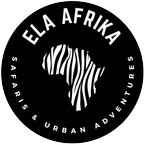
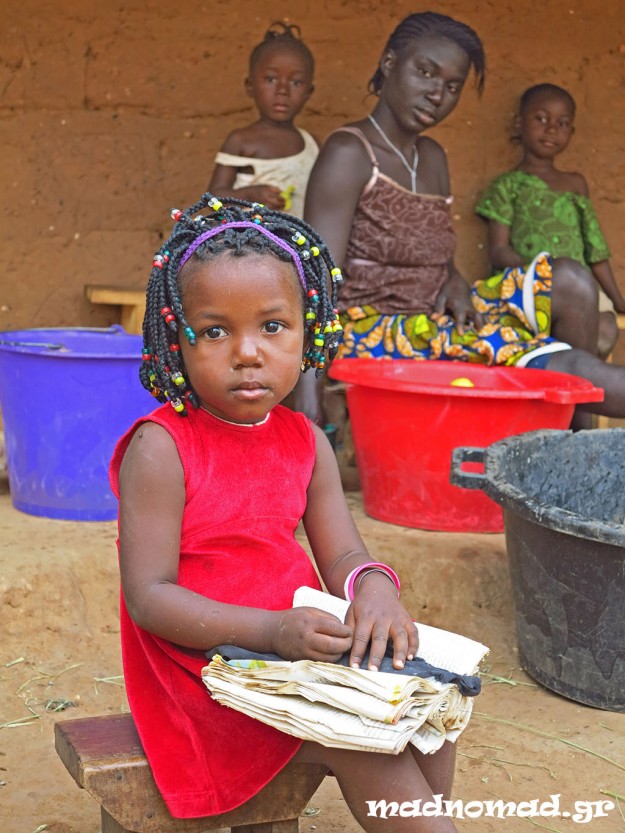
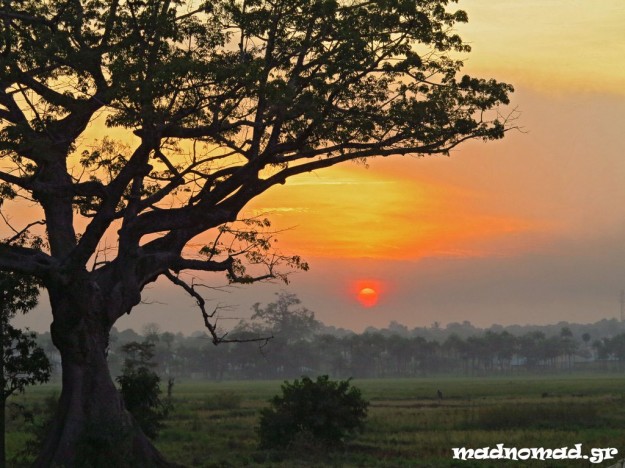
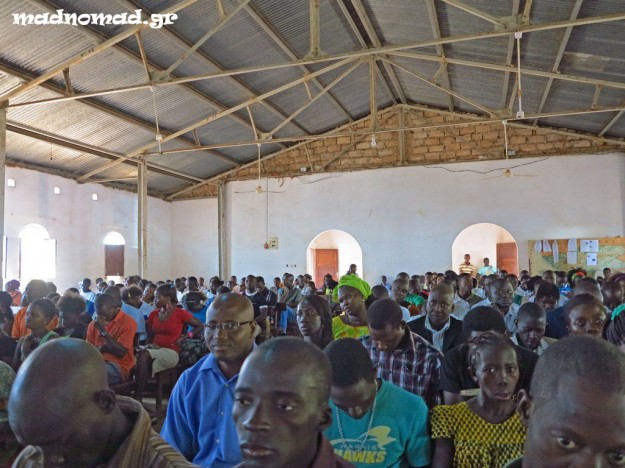
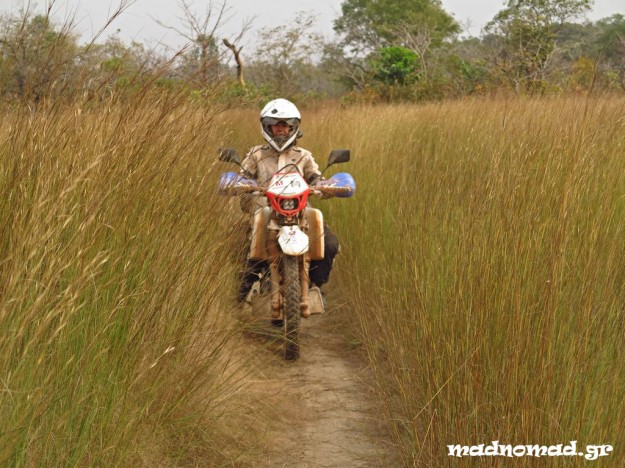



